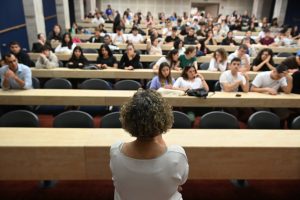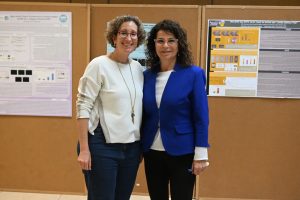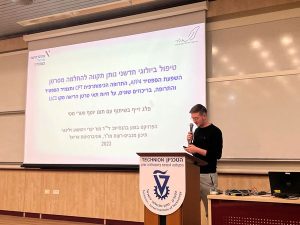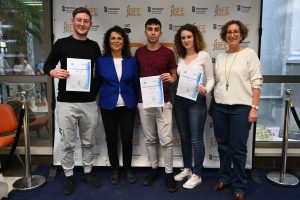Highschool Student Targeting Lung Cancer
Peleg Zeiff from Maccabim-Reut High School is the winner of the annual Biotechnology Olympics, his project focusing on targeted drug delivery in lung cancer
Peleg Zeiff, a 12th-grader from Maccabim-Reut High School took first place in the annual Biotechnology Olympics competition, the finals of which were held at the Technion – Israeli Institute of Technology earlier this month. Peleg explored the potential of using the αvβ3 integrin, a protein uniquely presented on lung cancer cells, as a target for delivering chemotherapy drugs. Cancer patients suffer a multitude of chemotherapy side effects caused by exposure of their whole body to the drugs needed to the cancer cells. Targeted delivery of the drug to the cancer cells would significantly reduce side effects and increase the effectiveness of the treatment.
The annual Biotechnology Olympics competition is held at the Technion for the sixth year running. It is supervised by Prof. Ayelet Fishman and Dr. Omer Yehezkeli of the Faculty of Biotechnology and Food Engineering at the Technion, and by Ms. Judith Deskalo, supervisor of the Biotechnology subject in the Ministry of Education. “This event is made possible thanks to a close collaboration between the schools and the faculty,” said Ms. Deskalo. “This collaboration is a great opportunity for the students who major in Biotechnology. Biotech and foodtech are becoming increasingly important globally. The biotechnology school program gives students hands-on research experience, in addition to theoretical knowledge.”
Prof. Sima Yaron, dean of the Faculty of Biotechnology and Food Engineering, addressed the students: “It is very exciting for me to see the future generation of researchers. You’ve learned to ask questions, develop methods to search for knowledge, and examine your findings. Those skills are a precious jewel you can keep through your life. I hope to see you here again as faculty students, in a few years.”
“I would like to thank the wonderful biotechnology teachers who work relentlessly to engage students in science and technology. I congratulate the finalists for their motivation and dedication. You all did such a wonderful job, it was difficult to choose the winning project,” said Prof. Fishman.
The first stage of the Biotechnology Olympics takes place at the start of the school year, and consists of a written exam. In the second stage, students present their research in the form of posters and are examined and judged by several teachers. Finally, five students advance to present their studies to a panel of judges at the Technion. The winning student is awarded full tuition scholarships for their first year in the Technion.
Peleg Zeiff started by finding out that the αvβ3 integrin appears on lung cancer cells, and does not appear in healthy lung cells. Then, he tested the possibility of using the peptide AFP4, which is known to specifically bind and inhibit the αvβ3. This experiment showed a reduction in cancer cell growth. Finally, he bound a chemotherapy drug to the AFP4. The AFP4 brought the chemotherapy uniquely to the cancer cells, reducing their viability by 80% without harming healthy cells. Peleg dedicated his project to the memory of Zehava Barak, founder of the Biotechnology program in Maccabim-Reut High School.
Eden Sapozhnikov from Eid Madaim School in Lod took second place, with a project about the role of the gene Paladin in breast cancer. Third place went to Yogev Yaakobi from Ort Rabin School in Gan Yavne, for a project about mutations in the α1 anti-trypsin gene. The runner-ups were Ilai Aviv from Ort Lilintal School in Ramla and Noya Raba from Makif D School in Ashkelon.
Prof. Yitzhak Reizel from the Faculty of Biotechnology and Food Engineering spoke to the students about the various applications of epigenetic markers. “Science needs young and motivated people to join the field,” he said. “There’s a lot more to study and discover.”






